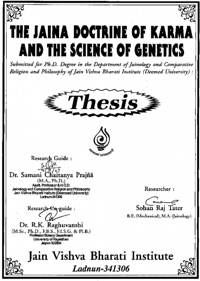Buddhist thinkers too have used the term 'karma' in the case of activity. They too call the physical, speech and mental activities as karma. Although the Buddhist have used the term karma for physical, linguistic and mental activities yet consciousness has been accorded primacy there and consciousness is called karma. Buddha pronounced, monks! consciousness is karma, I state. Man indulges in action (karma) physically, linguistically or mentally only through consciousness.[38]
In this context the meaning of consciousness being karma implies that all these acts are possible only if consciousness is associated with them. Consciousness is recognized as karma in Buddhist Philosophy, but that does not mean other karmas stand cancelled. They acknowledge the relative significance of all the aspects of karma. Thus, we find that though the term karma has been used in the sense of activity there, the meaning of the term is wide ranging, more than activity, in karma theory. The term includes physical, mental and linguistic activity and the effect of these activities left on pure consciousness. Generally the term karma denotes activities, the purpose of activities and their outcome. Ācārya Narendra Deva writes, "Mere consciousness (purpose) and action are not the whole of karma. We need to take into consideration the resultant consequences of karma too."[39]
Buddhism basically accepts two types of karma:
- Citta karma (mental actions).
- Caitaṣika karma (karmas arisen out of acts and speech).
- Akuśala karma (sinful karmas).
- Kuśala karma (virtuous karmas).
- Akuśala karma
According to Buddhism on physical, vocal and mental basis akuśala (sinful) karmas are the following ten types:
- Akuśala karma
- prāṇatipāta (violence),
- adattādāna (stealing),
- kamesu micchasāra (fornication)
- musavāda (falsies),
- pisunāvācā (pishum speech),
- pharusāvācā (harsh word),
- samphalāpa (useless bragging).
- abhijjā (greed),
- vyapāda (mental violence or malice),
- micchādiṭṭhi (false perception).[40]
(a) Physical sin
(b) Vocal sins
(c) Mental sins
- Kuśala karma (Virtuous deeds)
It is stated in saṁyukta Nikāya that he who donates food, drinks, clothes, bed, sitting objects in charity enjoys virtues as if streams of virtues falling to him from all sides. - Devotion
- Awareness
- Shame towards sin
- Fear of sins
- Relinquishment
- Friendliness
- Equipoise
- Purity of mind
- Cheerfulness in body
- Lightness of body
- Sweetness of mind
- Sweetness of body
- Lightness of mind
- Simplicity of mind
- Simplicity of body.[41]
The following acts are stated to be caitaṣika (virtuous) in Abhidhammatya saṁgrah:
 Prof. Dr. Sohan Raj Tater
Prof. Dr. Sohan Raj Tater
 Doctoral Thesis, JVBU
Doctoral Thesis, JVBU